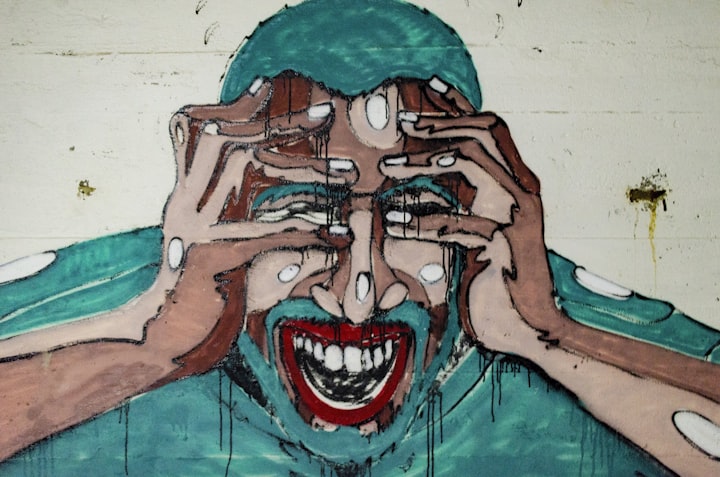Does All Creativity Come From Pain?
The different coping mechanisms

Sigmund Freud introduced this term, ‘sublimating’. I don't mean changing from a solid to a gas without bothering to turn into a liquid along the way which is chemical sublimation. I’ll explain it further. In Freud’s essay On Narcissism, Freud writes, “Sublimation is a process that concerns object-libido and consists in the instinct directing itself toward an aim other than, and remote from, that of sexual satisfaction; in the process, the accent falls upon deflection from sexuality.” For example, in Freud’s Leonardo da Vinci and a Memory of His Childhood, he argues that da Vinici’s repressed homosexual desires drove his scientific and artistic research.
Freud had this idea that pretty much all of human behavior could be explained by these unconscious conflicts that we had deep in our psyche. And that when you had to deal with the pain of these conflicts, like wanting to marry your mother, but not being able to, or wanting to do things that you couldn’t do, in some cases, you have a less mature response, but they were all coping mechanisms. And sublimation was a coping response that he would have said was a mature coping response which was essentially taking your pain and transforming it primarily through art, or through creativity, or more recently as Meryl Streep quoted as part of her sessile b Demille acceptance speech at the Golden Globes in 2017, ‘As my friend the dear departed, Princess Leia said to me once, take your broken heart make it into art’. Freud didn’t say that, but I think Freud would have endorsed that.
I do love my mother, but I don’t want to marry her.
Well, I know Freud wouldn't believe me. And I have my differences with Freud. I believe Freud’s definition of sublimation is more tied to sexual drive than just pain. I think if he would have lived long enough to see modern psychotherapy, he would have seen that he’s wrong but I agree that we have needs and drives and that sometimes in ways that we’re not fully aware of, we’re trying to meet them.
Is my art form sublimation?
Freud would say this is a waste of time because you can't ask somebody directly to introspect, but I think Freud was wrong. I would say, I do often think about why it is that I or anyone who was kind of excited and passionate about doing what they do, where the drive comes from, why is this the thing that I do, basically? And why is this thing still drive me to want to do it after doing it for a long time? And the thing that I do is essentially answer questions. In fact, the reason I started online writing years and years ago, was in part that my favorite part of reporting and research was often interviewing and speaking with people. And it's always heartbreaking when you write a magazine piece or a book, the vast majority of what people said, was cut out just because of the way the medium of text writing works. And so I really wanted more of the interview left intact, more of the conversation. And the reason I'm so drawn to that is that when I'm writing, it feels like magic.
The thing that I loved about journalism from the time I was about three, was that it allowed you, in some cases for me, forced you to go up to people and ask them questions that I simply wouldn't have had the nerve to do otherwise. I do know that I love what I do, in part because it is connected to something that for me, was a deep-rooted struggle which was being shy. And so it's one of the reasons that I'm most grateful that I get to have a living based on this thing that is actually mostly incredibly fun and scratches an itch, that is otherwise really hard to scratch. So I don't know if it's about marrying my mother. In fact, I think it's quite not. But I'm probably doing a whole lot of sublimating without knowing it.
In my desire to connect with other people, which shy people have as well as extroverted people have, I kind of find a way to find a solution, which is being a writer who gets very intimate with my articles. So you get to scratch the itch. But I don't have to deal with the things that I felt uncomfortable with either the beginning or the end of these interactions.
I also do probably 95% of my interviews remotely, which means that I’m in my home or office recording studio. So I don’t actually even have to make eye contact.
I just want to clarify that I have had in-person conversations and I can replicate a normal human pretty well. I’m adaptive in that way. But it’s very costly to my immune system. And like, I’m exhausted after an hour-long conversation with some other human.
Well, that’s a whole other level because not only is it a conversation with a stranger, but your mind is constantly trying to process and then get to the next place knowing that there’s a limited amount of time.
What’s more exhausting is that you’re having an interview, you’re kind of processing it on multiple levels. Also, there’s just a lot of information coming in and you’re synthesizing it in real-time.
I would say being at a party is more exhausting only because what you’re subtracting is usually the exhilaration of the conversation, not that every interview is exhilarating. But the conversations in my interviews aren’t just casual conversations with people I happen to want to talk to, you’re trying to find out information, you’re trying to learn something specific about some scenario or phenomenon or whatever. And so you’ve got a goal plus, you have to factor in if alcohol is a factor, which at a cocktail party that usually is. And in interviews, it’s usually not, that’s a big instrumental variable in human interaction. So you know, maybe I should drink more while interviewing or interview more while drinking less at parties.
Freud was right about a lot of things in the kind of broadest brushstrokes. The idea that we do a lot of things to avoid psychological pain — I think he was spot on. So I do believe that a lot of things that I do are defense mechanisms, in a sense, right things that avoid pain. So I am sure that in my life that I have been coping with things like trying to get needs met. But probably the explanations are a little less exciting than unresolved sexual conflict and much more in the realm of like, I grew up in a family where achievement was important. So I think maybe you could argue that the fact that I grew up in that environment, then I am so obviously achievement-oriented. In my family, I felt anyway, like love was somewhat proportionately meted out according to your accomplishments. So you get a little more love the day you get into Harvard. And I think that that probably did motivate me to please my parents and to be more accomplished. Maybe that’s a form of sublimation.
Yeah, we’re just human. I do get to scratch the itch of connecting with people and exploring human nature.
What is the opposite of sublimation? going directly from a gas to a solid without pressing?
So if you want to take Freud’s hierarchy of defenses or coping mechanisms, right, from the most mature, which is sublimation, but there are also some others; humor, altruism, you know, like turning your pain, not being able to have a child and then, for example, spending a lot of your energy in charity work for mothers or something, that would be altruism. And then there were the immature defenses, which are other coping mechanisms that had the effect of like, kind of getting you into more trouble, right? So narcissism, denial, famously passive aggression. I mean, people use this term vernacularly without probably even knowing that that’s synonymous. So I’m thinking that if I’m sublimating, I’m not doing it well enough.
As a financial planner or an economist, you might want to move some of your assets out of narcissism and passive aggression into the sublimation column. That might be a better way to invest your psychological energy.
If you want more insight on the topic, Sigmund Freud’s psychoanalyst daughter Anna Freud developed and elaborated on her father’s ideas about defense mechanisms in her 1936 work Ego and the Mechanisms of Defense. Many psychoanalysts, such as George Vaillant, went on to explore further types of defenses and coping mechanisms.
******** **************** **********************
Like what you read? Send me a gift below to help contribute to my next adventure!
You can also sign up for my mailing list here: https://bit.ly/3el7KKa
About the Creator
Blessing Akpan
I am a photographer of thoughts, let me capture your soul.






Comments
There are no comments for this story
Be the first to respond and start the conversation.